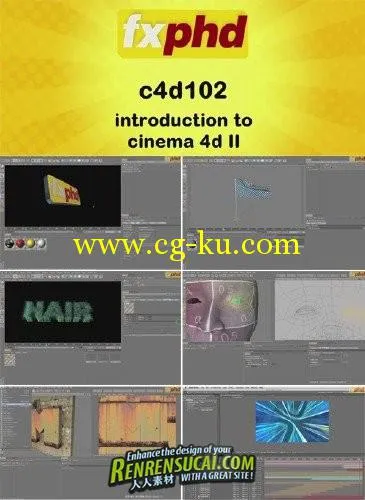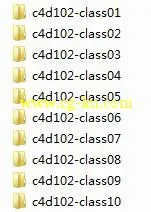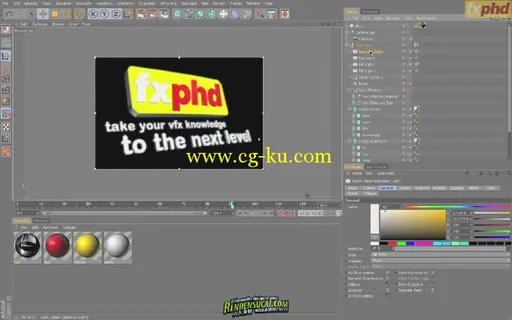本教程是由fxphd最新出品的C4D综合教程II。
fxphd - C4D102 - Introduction to Cinema 4D II | project files | .mov | 1.73Gb
This course will complement the C4D101 course and further develop your skillset when working with Maxon’s Cinema4D. Alongside the core Cinema4D concepts, the 102 course will include classes on using some of the popular modules available for Cinema4D, including Cloth, Sketch & Toon and MoGraph, as well as an introduction to using Bodypaint3D and understanding the concept of UV mapping and texture painting within the application. The classes will be both practical workshops and project based classes, further enhancing your experience of using the core Cinema4D application, Bodypaint3D and the available modules.
Tim Clapham is a multi-disciplinary animator and compositor and one of our members favorite profs. With over 11 years of industry experience, Clapham is an industry recognized expert in Cinema 4D and After Effects. As Company Director at Luxx in Sydney, Australia, Tim works with a wide range of global advertising and broadcast companies, producing world-class content that is both technically challenging and innovative.
Professor: Tim Clapham (TimC)
Class 1: Creating a short logo animation part 1. Using subdivided splines for smooth deformation. Fracture object with ExtrudeNURBS and Plain Effector to animate type.
Class 2: Creating a short logo animation part 2. Animating the logo using animation layers. Creating glossy materials and a basic light setup. Rendering with Picture Viewer.
Class 3: Introduction to the Hair Module. Using the Hair Object. Styling hair and working with the Hair Material. This class also covers cloning with Hair and Hair dynamics.
Class 4: Introduction to the Cinema4D cloth module. Exploring the Cloth Tag parameters. Cloth collisions with regular objects. Using ClothNURBS for smoothing and thickness. Belting Cloth to Polygon objects.
Class 5: Working with the Sketch and Toon module to create Non-Photorealistic Renders. Exploring the sketch render options, sketching individual objects with unique materials. Finally creating a watercolour type line from scratch.
Class 6: Introducing Bodypaint 3D. This week we take a look at manipulating UVs and creating UV maps. This will cover different UVW projections, interactive mapping and the Bodypaint Setup Wizard.
Class 7: Texture manipulation with Bodypaint 3D. This week we continue our exploration of Bodypaint, focusing on the texturing features. Subjects covered include working with layers, filters, multichannel painting and projection painting. This class also covers baking textures.
Class 8: Week one of a three week project. Creating a logo animation for Top 100 Countdown. This week we create the text from illustrator artwork. Model a clock dial using Cloner and Shader Effector. Colour the dial with the MoGraph color shader. Animate the effectors using Xpresso.
Class 9: Week two of a three week project. Adding animation to the project. Working with F-Curves. Creating the tunnel of clock dials and other graphic elements using standard particles combined with MoGraph Tracer, Cloner and a combination of effectors. Scene management with layers.
Class 10: Week three of a three week project. An extended class of 1hr 30mins, including bonus 30 minutes working in After Effects. First we add basic lighting and finalise our materials in Cinema4D. Create a geometric zoom from the Top 100 model. Add streaks of light with Tracer. Create a wipe with Cloner and Boolean operations. Set-up multipass and AEC export. Render the 3D passes and then complete basic composite and grade in After Effects.
Home page: http://www.fxphd.com/courses#C4D102
【



发布日期: 2011-7-7